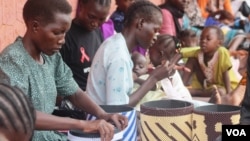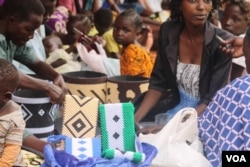A group of women from the Greater Equatoria region are in Wau, South Sudan, to train dozens of other women on how to make handicrafts that they can sell to earn a living.
Thirty young women are learning how to make handbags, wallets and tablecloths from local materials such as beads. Officials of the Juba-based Women Advance Organization, which put together the training, say they believe the new skills not only will enable young women to earn money, but also will create jobs for other women.
Dozens of women sit on locally made carpets at the Youth and Sports Center in Wau, each holding a needle and spools of threads in different colors, sewing together a variety of handcrafts, including colorful tablecloths.
In one corner sits a basket full of handmade handbags, wallets and table mats, all ready to be sold in local markets.
The women are expected to spend two more weeks learning their skills.
‘Happy to learn’
Munira Michael, who has been selling tea in the local market to earn a living, has learned how to make beautiful tablecloths. With a broad smile on her face, Michael said she has learned a worthwhile skill that will help her earn extra income to supplement what she gets from her tea business.
Michael said that for the last two weeks, she has learned how to sew and knit, and has secured three customers who are willing to buy each of her handmade items for 600 South Sudanese pounds, or about $100.
"I am happy to learn how to make three designs of table sheets. I usually make them when I get home,” she said. “Up to four customers have come saying they need this or that design. It's a good business."
Fashionable, eco-friendly
Victoria Sote said the products she is learning to make are also friendly to the environment. She said she is encouraging other girls to embrace these new skills and to teach women in their communities how to do the same.
She says that instead of using plastic material to make bags, which harms the environment, women should use bags made from locally grown materials.
"It is very economical, unlike plastic bags,” she said. “You can go with this product even to the church and wedding parties because it is of fashion."
Everisia Eliseo Roko is good at knitting wallets. She said that after she completes the training, she will teach other young women so they can work in a group to produce similar products for sale.
"I have learned how to make bags and wallets, and after we have finished with the learning, I am going to start my own. For example, making wallets and bags for women,” she said. “This has made a great difference because you cannot find a wallet made out of beads here unless it is imported from East Africa."
It takes an individual two days to produce a single handmade tablecloth or handbag.
Ready to sell
Hosana Angela Atoroba, who is coordinating the training, said that for the last two weeks the women have produced hundreds of items ready to be sold at an exhibition next week.
"We are going to hire a place where we shall be selling the products, and on the sixth of June is when we shall make the exhibition for the first products and sell most of the products, and the remaining ones [we] will stock in a shop that we shall open for them."
Hundreds of women in the greater Equatoria region, especially the former Central Equatoria state, already are earning income from making and selling handicrafts.
Jusphine Ropi, who is now a tutor, learned the skills in 2013 while in Kajokeji County. She said the business has helped her earn a steady income. Now, she said, she can easily afford to pay tuition fees for her three children.
"The knitting helps women get busy during your leisure time and have no time for rumor mongering. You will be busy and have a peaceful mind making money,” Ropi said. “Especially me, for example, when I learned this in Kajokeji, I had an interest and I could make bags and tablecloths and get money, which now I am using for paying my children at school."
Ropi said she wants to help provide women with creative skills that will enable them to become self-sufficient and compete in today's changing business environment.





